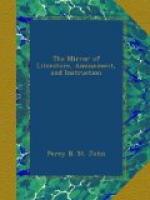He ate an early dinner, went by times to the theatre, and established himself in a snug corner of the stage box. The house filled, the hour of commencement arrived, the fiddlers paused and looked towards the curtain, but hearing no signal they fiddled another strain. The audience became impatient; they hissed, they hooted, and they called for the manager: another pause, another yell of disapprobation, and the manager pale and trembling appeared, and walked hat in hand to the front of the stage. To Dumps’s great surprise it was the very man who visited him in the morning. Mr. Opie cleared his throat, bowed repeatedly, moved his lips, but was inaudible amid the shouts of “hear him.” At length silence was obtained, and he spoke as follows:—
“Ladies and Gentlemen,
“I appear before you to entreat your kind and considerate forbearance; I lament as much, nay more than you, the absence of Mr. Liston; but, in the anguish of the moment, one thought supports me, the consciousness of having done my duty. (Applause.) I had an interview with your deservedly favourite performer this morning, and every necessary arrangement was made between us. I have sent to his hotel, and he is not to be found. (Disapprobation.) I have been informed that he dined early, and left the house, saying that he was going to the theatre; what accident can have prevented his arrival I am utterly unable to—”
Mr. Opie now happened to glance towards the stage box, surprise! doubt! anger! certainty! were the alternate expressions of his pale face, and widely opened eyes; and at length pointing to Dumps he exclaimed—
“Ladies and gentlemen, it is my painful duty to inform you that Mr. Liston is now before you; there he sits at the back of the stage box, and I trust I may be permitted to call upon him for an explanation of his very singular conduct.”
Every eye turned towards Dumps, every voice was uplifted against him; the man who could not endure the scrutiny of one pair of eyes, now beheld a house full of them glaring at him with angry indignation. His head became confused, he had a slight consciousness of being elbowed through the lobby, of a riot in the crowded street, and of being protected by the civil authorities against the uncivil attacks of the populace. He was conveyed to bed, and awoke the next morning with a very considerable accession of nervous malady.
He soon heard that the whole town vowed vengeance against the infamous and unprincipled impostor who had so impudently played off a practical joke on the public, and at dead of night did he escape from the town of Tewksbury, in a return mourning coach, with which he was accommodated by his tender hearted landlady.
Our persecuted hero next occupied private apartments at a boarding-house at Malvern. Privacy was refreshing, but, alas! its duration was doomed to be short. A young officer who had witnessed the embarrassment of “the stranger” at Tewksbury, recognised the sufferer at Malvern, and knowing his nervous antipathy to being noticed, he wickedly resolved to make him the lion of the place.




